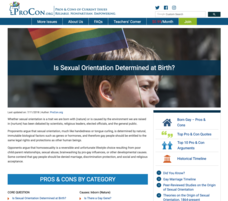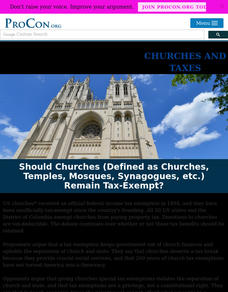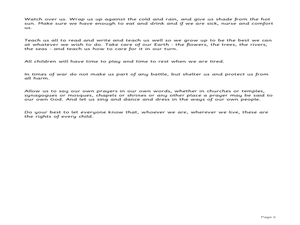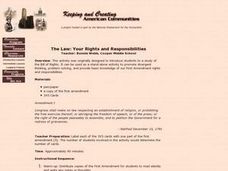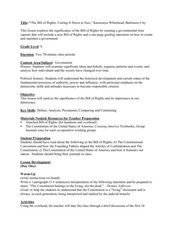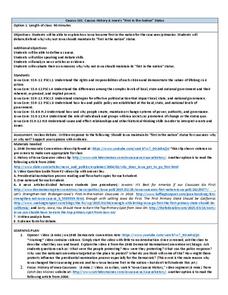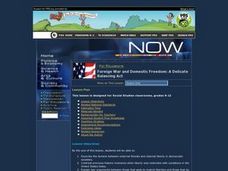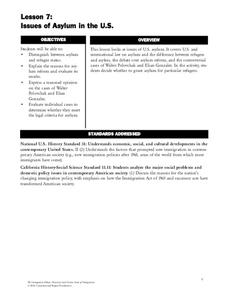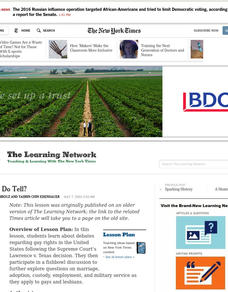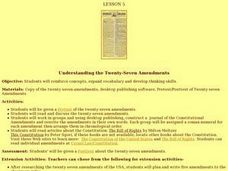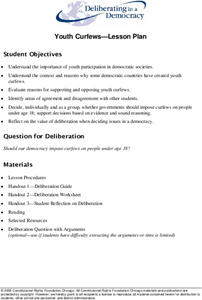Curated OER
Born Gay
Is a person's sexual orientation determined at birth? With the informative website, scholars prepare for a debate about the topic. They learn the top pro and con arguments and read through a historical timeline of homosexuality. They...
Annenberg Foundation
Egalitarian America
What does a true American represent? Scholars investigate the equal rights era of the 1960s and 1970s in the 20th installment of a 22-part series on American history. Using photographic, magazine, written, and video evidence, groups...
Advocates for Human Rights
Civic Engagement and U.S. Immigration Policy
To conclude their study of immigration and human rights, class members create a civic engagement project centered on an issue of immigration and designed to influence US immigration policy. They examine examples of attempts to influence...
Curated OER
Churches and Taxes
Churches have been tax-exempt since the founding of America, but should they be? Pupils ponder the question as they browse the website in preparation for a class debate or discussion. They research the history of tax-exemption for...
Facing History and Ourselves
The Audacity of a Vote: Susan B. Anthony’s Arrest
Susan B. Anthony's speech "Is It a Crime for Women to Vote?" takes center stage in a lesson that asks class members to consider how they might respond to what they consider an unjust law. Groups work through the speech paragraph by...
Curated OER
English and Literacy: Children's Rights - Expanded Paragraphs
Students write expanded paragraphs about children's rights. In this writing and children's rights lesson, students listen to Caroline Castle's, For Every Child, noting the points about children's rights on each page. They discuss each of...
Curated OER
The Constitution Lives! How it Protects Your Rights Today
Students brainstorm their rights as Americans. In this The Constitution Lives! lesson plan, students discern the difference between rights and rules by completing a worksheet. Students consider the differences between types of...
Curated OER
The Law: Your Rights and Responsibilities
Students explore First Amendment rights and responsibilities.
Curated OER
The Bills of Rights: Cutting It down to Size
Eighth graders explore democratic values. For this U. S. Constitution lesson, 8th graders read the Bill of Rights and consider the significance of the amendments. Students design a governmental time capsule that includes their own plan...
Curated OER
Who Owns Water
Students role play how water is allocated to different holders of water rights. In this ecology lesson plan, students identify the different water rights available. They explore problems associated with water use including drought,...
Caucus 101
Caucus History and Iowa’s “First in the Nation” Status
What is a caucus? Why is Iowa's first? Why did Iowa shift to the caucus format? After researching these basic questions, class members debate the question of whether or not Iowa should maintain its "first in the nation" status for caucuses.
Curated OER
Defending the Homeland--The Alien and Sedition Acts of 1789
Students explore that there have been times during the history of the US when ,in response to real and perceived threats, both domestic and foreign, our country has responded by passing legislation. Students trace the fundamental rights...
Constitutional Rights Foundation
Suppressing the Vote
Voting rights have expanded over time, but some voters are still being suppressed. A thought-provoking resource explores the history of voter suppression in the US and efforts to remove roadblocks to voting. Young historians learn about...
Curated OER
Your Safety and Security or Your Civil Liberties - Which is More Important?
Students examine provisions of USA PATRIOT Act and controversies that led the ACLU to take legal action against the legislation. They create, conduct, and document results of a survey related to the PATRIOT Act and controversies...
Alabama Department of Archives and History
Booker T. Washington and W.E.B. DuBois
Where to begin? With the vocational education that provides the skills necessary to gain economic security or with a Liberal Arts education? As part of a study of leaders of the civil rights movement, class members compare and contrast...
NYC Department of Records
Citizenship and Elections: The Importance of a Ballot
Approximately 58 prcent of those eligible voted in the 2016 US Presidential election. In an attempt to impress upon learners the importance of voting and voting rights, class members examine primary source documents related to the...
Curated OER
Racial Profiling
Students debate both positions on the controversial topic of racial profiling with support for each and then develop a consensus position on how racial profiling as a law enforcement tool should be used.
Curated OER
All Rights Reserved?
Learners explore, through discussion, research, dramatic skits, and writing, the debate over genetic ownership of biological products and evaluate the economic viewpoints of the countries and companies involved.
Curated OER
Foreign War and Domestic Freedom: A Delicate Balancing Act
Students investigate civil liberties in the U.S. They watch and discuss a PowerPoint presentation, conduct research on an event from a timeline, complete a worksheet, take an ideology quiz, and conduct a debate.
Constitutional Rights Foundation
Issues of Asylum in the U.S.
Who gets to come to the United States? Examine cases of individuals seeking asylum with an informative reading passage that includes examples, statistics, and representations of public opinion regarding asylum. Groups then go on to...
Curated OER
Do Ask? Do Tell?
Students explore debates regarding gay rights following the Supreme Court's Lawrence v. Texas decision. They participate in a fishbowl discussion, exploring questions on marriage, adoption, custody, employment, and military service.
Curated OER
Understanding the Twenty-Seven Amendments
Students use the Internet to learn about the Constitution. In this Constitutional Amendments lesson, students read and discuss the twenty seven amendments and work in groups to rewrite the amendments in their own words. Students read...
Canadian Civil Liberties Education Trust
That’s Not Fair!
As part of a series of critical thinking exercises, kids consider issues of social justice, especially the factors that must be considered when trying to balance conflicting rights and freedoms.
Deliberating in a Democracy
Youth Curfews
Don't stay out too late! Scholars analyze the need for youth curfews in a democratic society. They examine primary documents, case studies, and short video clips to form their opinions and take a position on the issue. Holding a class...


